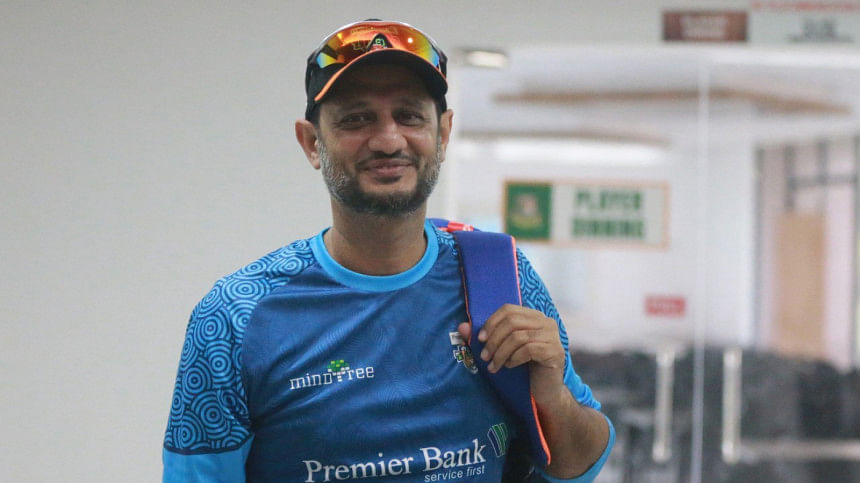‘Skill development key between now and the WC to be competitive’

Mohsin Sheikh was appointed as Bangladesh team's analyst for the New Zealand tour where the Tigers won their first ODI and T20I matches on New Zealand soil. Even though his contract has not been finalised, the Pakistani coach-turned-analyst identified the key to going into the T20 World Cup in West Indies and USA this year. Mohsin, who's working as BPL outfit Khulna Tigers' analyst this season, talked about the nuances of his work and the strategies for the T20 World Cup in an interview with The Daily Star's Abdullah Al Mehdi. Following are the excerpts:
The Daily Star (DS): How has been the transition from a coach to an analyst for you? Is it easy for you to understand the players because you were a coach before?
Mohsin Sheikh (MS): Definitely. Look, that's the advantage I bring into the analysis space because I worked with Pakistan U19, Australia U19 before I transitioned over to being an analyst.
I started working as a coach in 1999. In 2008, I transitioned over to analysis. It was about nine years that I worked both at Australian national level and Pakistan national level which helps me as an analyst in understanding the coaching psychology and coaching mentality. Then passing on the message becomes easier because you understand both sides of the coin.
DS: Does it help you overcome the language barrier when working with the national team since you have worked in the BPL?
MS: Hundred percent. When I was in New Zealand as well, that was my first chance to work with guys like (Najmul Hossain) Shanto. It's very easy because there's no language barrier. Shoriful (Islam) and Mustafizur (Rahman), the senior bowlers, were there when we were talking about plans and tactics about winning in New Zealand. It helped and you see the results.
First time we won in New Zealand in a one-dayer and in the T20. If the rain didn't affect us in the one-dayers, we could have won another one-day. So, results will show, and that translates into how well the team is doing. The more the players are accepting what the message you're giving, the better the team does.
DS: What's your work like, as an analyst, in terms of collecting data and then playing things by ear?
MS: First thing as an analyst, you've got to rely on the trends and analysis. Those are the building blocks. No point looking at the opposition's weakness, if you don't have the skill-set to match it.
So if we don't have a left-arm fast bowler, there's no point looking at how a guy plays a left-arm fast bowler. You need to understand what's the strength of your team.
Against Babar Azam, for example, last year we attacked the stumps. With [Mohammd] Wasim, his skill set, our plan was to attack the stumps and we got him out. Babar is skilled, so if we can plan accordingly, we can execute.
DS: Has the BCB talked to you about how long you will work? Do you prefer a long-term contract?
MS That's still in the process, nothing finalised. I think after BPL they'll finalise, because there's a series coming up against Sri Lanka. So let's hope. If I'm offered a long-term contract, it would be good because that's what my initial thinking is, since I have worked in other systems quite long-term.
DS: How accepting were the Bangladesh players of data in New Zealand?
MS: Very good. I know the coach from Australia, Chandika (Hathurusingha), is very accepting of data and analysis.
He gave me freedom to speak to the guys and you understand what your role is, then you perform it. He does not hold you back. Quite a young lot, guys like (Anamul Haque) Bijoy, Shanto, Shoriful. You don't approach them randomly. You have some basis to approach them, and that's where acceptance was fantastic. And the game plan worked in New Zealand.
DS: How to prepare for opposition leg-spinners since there is a dearth of them in domestic circuit?
MS: You can keep bringing in your young leg-spinners into the system and encourage the batters to play against this. There's external help with things like Merlyn, which is a kind of a bowling machine that helps with leg-spin as well.
We have that in Cricket New South Wales. We use that to bowl leg-spin to our batters.
DS: Do we have it here in Bangladesh?
MS: We will get that. The resources you collect will help our batters play against a certain skill-set and they will improve that skill.
My role would be in contributing towards players' development. How we can develop our skill-set to go from winning in New Zealand to winning in Australia, in foreign conditions, with an eye on the World Cup coming up in the West Indies. So, the input has to be how to develop the skill-set for those conditions so that you can continue your winning momentum.
DS: What would be key in the West Indies?
MS: I think the main thing is those surfaces will still be slow and low. They will suit teams from the subcontinent. They will suit the spinners. So, if Shakib (Al Hasan) is fit, he will come in with a lot of experience in the middle of the batting and with the spin bowling as well. Then you have other spinners coming in and the batting group's ability comes in also. It's about developing that skill over the short-term that is left between now World Cup to make sure that we continue to repeat those things to be very competitive in the World Cup

 For all latest news, follow The Daily Star's Google News channel.
For all latest news, follow The Daily Star's Google News channel. 



Comments